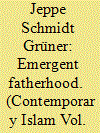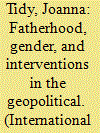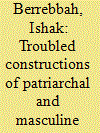| Srl | Item |
| 1 |
ID:
180004


|
|
|
|
|
| Summary/Abstract |
This article explores how new practices and articulations of fatherhood are emerging
among Muslim men in Denmark. With an explicit focus on care as both practice and
ideal, the article accounts for the emergence of new forms of fatherly commitment,
intimacy, and caregiving in domestic life. Drawing on ethnographic material from
different social housing areas in and around the city of Copenhagen, I show how these
new practices and imaginaries of fatherhood are assemblages of both Islamic ethics and
values afforded by the Danish welfare state. Exploring the interlacement of care, Islam,
and fatherhood in Denmark, the article provides a nuanced perspective on the various
social roles of Muslim men as both fathers, sons, and husbands.
|
|
|
|
|
|
|
|
|
|
|
|
|
|
|
|
| 2 |
ID:
158663


|
|
|
|
|
| Summary/Abstract |
War and peace are gendered and gendering geopolitical processes, constituting particular configurations of masculinity and femininity. When men are considered in relation to war and peace the majority of scholarly accounts focus on soldiers and perpetrators, typically observing their place in the gendered geopolitical solely through military/ized masculinities. In contrast, this article examines fatherhood as a masculine subjectivity, interacting in a nexus with other masculinities to produce an intelligible propeace intervention in war, and considers the implications for our understandings of gender and the geopolitical. To analyze this political subjectivity of what I term “paternal peace,” the article considers the case of Bob Bergdahl. Bergdahl’s son was a US soldier held by a Taliban-aligned group for five years until 2014. During this time Bergdahl was publically critical of US foreign policy, presenting his son’s release as part of a peace process that could end violence in Afghanistan. I unpack how Bergdahl’s public political subjectivity was the outcome of a “gender project” drawing on accounts of “valley” fatherhood in combination with particular forms of diplomatic and military masculinity. I consider how Bergdahl’s intervention was publically received, and how the geopolitical reach of it was pacified within gendered and racialized coding.
|
|
|
|
|
|
|
|
|
|
|
|
|
|
|
|
| 3 |
ID:
155540


|
|
|
|
|
| Summary/Abstract |
Latin America has long been known for its low marriage rates and high rates of children born outside of marriage. Beginning in 2000, politicians across the region began promoting “responsible paternity,” sponsoring legislation to help women track down their children’s fathers and subsidizing DNA testing that could hold the men responsible for financial support. Nara Milanich, an associate professor of history at Barnard College, describes how these policies have been shaped not by the wishes of low-income mothers but by the political agendas of neoliberal states.
|
|
|
|
|
|
|
|
|
|
|
|
|
|
|
|
| 4 |
ID:
187763


|
|
|
|
|
| Summary/Abstract |
This article introduces the complex and troubled constructions of Arab masculine and patriarchal identities depicted in Laila Halaby’s West of the Jordan, as told from the gaze of the novel’s female protagonists. It suggests that the politics of Arab male characters’ gender identity entail convoluted understandings, projecting them in both the diaspora and the homeland. The analysis in this article put flesh on the bones of some central questions regarding what problematises and affects masculinity and patriarchy in an Arab context. In addition to analytical and critical approaches to the novel, this article relies on a socio-cultural constructionist approach based on the perspectives of critics and theorists such as Raewyn Connell, Fadia Faqir, Fatima Mernissi and Homi Bhabha.
|
|
|
|
|
|
|
|
|
|
|
|
|
|
|
|